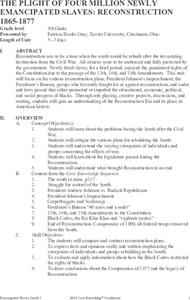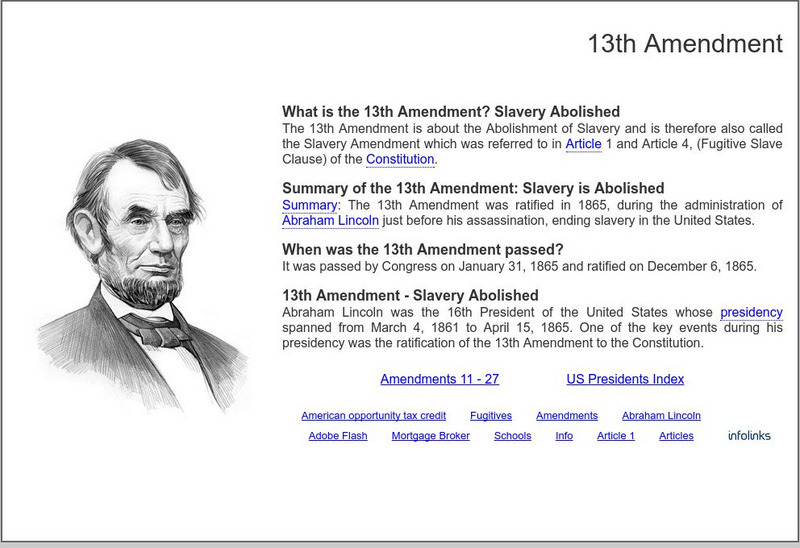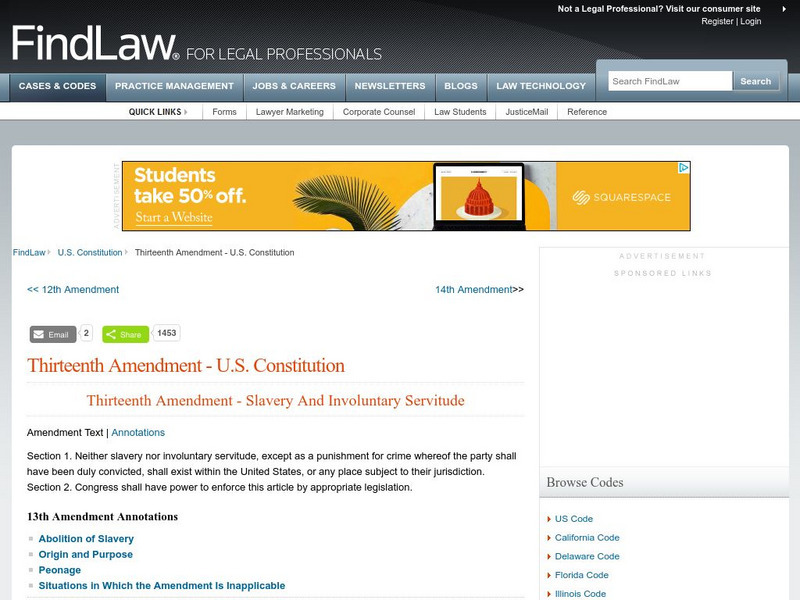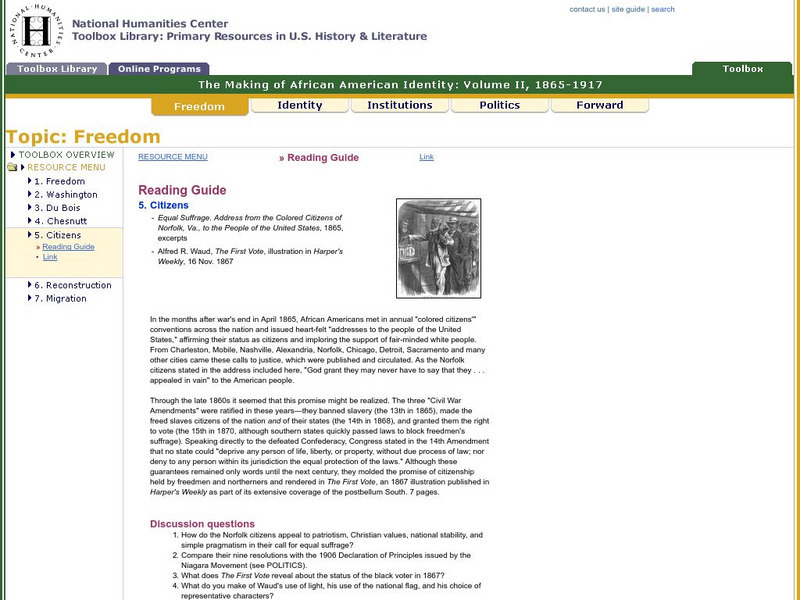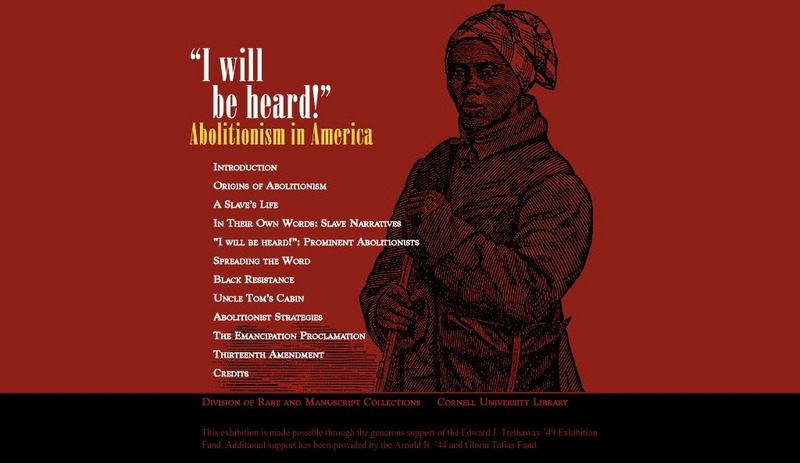Curated OER
Constitutional Amendments And Gay Marriage
Upper graders critically examine the history and process of amending the U.S. Constitution in light of the current issue facing the courts on legalizing gay marriage. They read a variety of articles, watch news clips, and develop a...
Curated OER
Constitutional Amendments and Gay Marriage
High schoolers study the legal battles involving same-sex marriage. They examine primary sources and a video regarding the 14th amendment and its implications for gay marriage. They analyze a report of a California case that was sent to...
Curated OER
What are the 13th,14th, and 15th Amendments?
The 13th, 14th, and 15th Amendments are outlined in this PowerPoint. Each amendment is noted on its own slide, with a summary of its purpose and important sections of the actual document. Tip: Have students choose an amendment and write...
Curated OER
Reconstruction (1865-1876)
Easily broken into pieces for several class sessions, this presentation is a great way to transition your class out of a Civil War unit and closer to the 20th century. Engaging photographs, including relevant maps and humorous political...
National Constitution Center
Thirteenth Amendment Poster
President Lincoln believed in the Thirteenth Amendment so strongly that he signed 14 copies of it, but died before he could see it passed on December 18, 1965. Explore the text that forever abolished slavery in America with a document...
Library of Congress
The Emancipation Proclamation and the Thirteenth Amendment
How did the Emancipation Proclamation lead to the Thirteenth Amendment? Middle schoolers analyze primary source documents including the text of the Emancipation Proclamation, political cartoons, photographs, and prints to understand the...
Curated OER
A Lesson on Reconstruction Legislation and Amendments
Students study the legislation and Amendments of Reconstruction period in America. In this Reconstruction lesson, students work in groups to dissect the Black Codes, an article in the US Constitution, as well as the 13th, 14th, and 15th...
Curated OER
Segregated America
Students investigate Jim Crow laws. For this segregation lesson, students analyze images that display American segregation. Students use the provided questions to aid them in their evaluation of the images.
Center for History and New Media
A Look at Virginians During Reconstruction, 1865-1877
The transition between rebellion to reunification was not smooth after the Civil War. Young historians compare primary and secondary source documents in a study of the Reconstruction era in Virginia, noting the rights that were not...
Curated OER
What price Freedom! Civil War and Reconstruction
Fifth graders become familiar with the events of Reconstruction and the 13th, 14th, and 15th amendments. In this reconstruction lesson, 5th graders work in pairs where each student creates a building with blocks and draws it. Their...
Curated OER
The Plight of Four Million Newly Emancipated Slaves: Reconstruction - 1865-1877
Students study the Reconstruction Era after the US Civil War. In this Reconstruction lesson set, students examine the problems that were encountered by the South after the Civil War, look at different plans for Reconstruction, and...
Curated OER
Reconstruction
Students investigate the historical period of the Reconstruction and the events that surrounded the abolitionist movement. Students use guided questions to conduct research. Then they complete a venn diagram in order to compare two...
Curated OER
With malice toward none, with charity for all: The life of Abraham Lincoln
Students research Abraham Lincoln in a variety of ways. In this Abraham Lincoln lesson plan, students use primary sources, vocabulary activities, books, and more to research and learn about Abraham Lincoln.
Curated OER
Lesson 8: After Slavery: Stowe's Vision
Eighth graders read Uncle Tom's Cabin by Harriet Beecher Stowe.
Cornell University
Cornell University: Library: I Will Be Heard: The 13th Amendment
Read the text of the 13th Amendment, adopted in January, 1865, even before the end of the Civil War, which ended slavery in the United States. Click on the image to see a larger picture of the document itself.
Siteseen
Siteseen: Government and Constitution: 13th Amendment
The 13th Amendment was passed by Congress on January 31, 1865, but not ratified until December 6, 1865. This article provides an explanation and summary of the 13th Amendment or Fugitive Slave Clause that abolished slavery.
PBS
Pbs Learning Media: The Reconstruction Amendments
In this interactive lesson, students will understand and explain the key provisions of the 13th, 14th and 15th Amendments to the U.S. Constitution, commonly referred to as the Reconstruction Amendments.
Thomson Reuters
Find Law: u.s. Constitution: Thirteenth Amendment
This source provides the Thirteenth Amendment as it is worded in the U.S. Constitution. At the bottom of the page are annotations with links to information about the abolition of slavery, origin and purpose of the amendment, peonage, and...
Curated OER
Passge of the 13th Amendment
Passge of the 13th amendment. Scene in the House on the passage of the proposition to amend the Constitution, January 31, 1865.
National Humanities Center
National Humanities Center: Toolbox Library: Citizens: African American Identity: 1865 1917
Discusses the efforts of African Americans to be recognized as equal citizens after the Civil War, and the 13th, 14th, and 15th Amendments. Includes links to supplemental information.
Cornell University
Cornell University: Library: I Will Be Heard! Abolitionism in America
A collection of original manuscripts, letters, photographs, rare books, and other materials on abolitionism from the 1700s through 1865.
iCivics
I Civics: Civil War & Reconstruction
The Civil War and Reconstruction Era brought about the end of slavery and the expansion of civil rights to African Americans through the 13th, 14th, and 15th Amendments. Compare the Northern and Southern states, discover the concepts of...
Other
Basd: Reconstruction [Pdf]
A very clear document outlining the various reconstruction plans, the problems for both whites and blacks during Reconstruction, and the amendments added concerning the abolition of slavery, civil rights, and suffrage. Requires Adobe...
University of Virginia
Miller Center at Uva: u.s. Presidents: Abraham Lincoln
The Miller Center of Public Affairs at the University of Virginia offers biographical information on Abraham Lincoln (1809-1865 CE), including short-answer basics and a "Life in brief."












